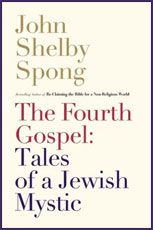"I have wrestled with the Christian faith for all of my now eighty-two years and I find myself at this moment, to the surprise of my traditionalist critics, I'm sure, more deeply committed to my Christ and to my faith than ever before. My commitment is, however, to a new understanding of both the Christ and Christianity. I am increasingly drawn to a Christianity that has no separating barriers and that does not bind me into the creeds of antiquity. It is a Christianity that cannot be contained by or expressed through traditional liturgical forms. I have no desire to find certainty or to embrace religious security," writes John Shelby Spong in the preface to his interpretation of the Gospel of John, which is the favorite of millions of ordinary Christians as well as those who used it to chase down and murder heretics in the days of the Inquisition.
What are some of the conclusions reached by this controversial Bishop after his five-year study of the Fourth Gospel?
• It was not written by John Zebedee or any of the disciples of Jesus; the gospel was probably penned by three different writers/editors.
• None of the words used in the text as those of Jesus were ever spoken by him and all of the miracle stories never took place (changing the water into wine, feeding the multitude with five loaves and two fish, or the raising of Lazarus from the dead).
• Most of the characters in the Fourth Gospel are the literary creations of the author (such as Nicodemus, the Samaritan woman by the well, and Nathaniel).
• These tales of a Jewish mystic challenge us to a non-literal perspective.
Whereas most of his critics will take everything he writes here as heresy, Spong advocates that we approach the Gospel of John as the tales of a Jewish mystic. He finishes his own study in a state of "wordless wonder." He envisions a new Christianity propelled by the Spirit and open to living the love and the peace and the resurrection by crossing "the boundaries of fear that separate us from one another and from ourselves."
